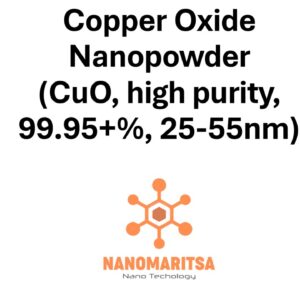Iron oxide nanopowder (Fe₃O₄, 99.9%, 8 nm) is a high-purity nanomaterial that combines exceptional magnetic, chemical, and physical properties. Its intermediate nanoscale size and magnetic behavior make it a valuable material for applications in biomedicine, environmental science, catalysis, and advanced technology.
Composition and Structure
- Fe₃O₄ (Magnetite):
- A mixed-valence iron oxide where iron exists in +2 and +3 oxidation states, contributing to its magnetic characteristics and electrical conductivity.
- Known for its excellent stability and versatile functionality.
- Purity (99.9%):
- High purity ensures minimal interference from impurities, making the material suitable for precision applications in electronics, medicine, and research.
- Particle Size (8 nm):
- At this size, the nanopowder provides:
- A balance between high surface area and stability.
- Superparamagnetic behavior, enhancing its performance in dynamic magnetic applications.
- Greater ease of handling compared to ultra-small particles.
- At this size, the nanopowder provides:
Properties
- Magnetic Behavior:
- Exhibits superparamagnetism, where particles magnetize under an external field but do not retain magnetism when the field is removed.
- High Surface-to-Volume Ratio:
- Increases reactivity, adsorption capacity, and interaction with other materials.
- Chemical Stability:
- Maintains performance in various environmental and operational conditions.
- Biocompatibility:
- Suitable for biomedical applications when functionalized appropriately.
Applications
1. Biomedical Applications:
- Targeted Drug Delivery:
- Functionalized Fe₃O₄ nanoparticles can carry therapeutic agents to specific tissues or cells under the guidance of a magnetic field.
- MRI Contrast Agent:
- Enhances imaging quality due to its magnetic response, improving diagnostic accuracy.
- Hyperthermia Therapy:
- Generates heat under alternating magnetic fields to selectively treat cancerous cells.
2. Catalysis:
- Efficient Reaction Catalysis:
- Acts as a catalyst in various organic and inorganic reactions, improving reaction rates and selectivity.
- Environmental Catalysis:
- Facilitates the breakdown of pollutants and organic waste in air and water purification systems.
3. Environmental Applications:
- Water Treatment:
- Adsorbs contaminants such as heavy metals, oils, and dyes, contributing to clean water initiatives.
- Pollutant Remediation:
- Catalyzes the degradation of harmful industrial byproducts.
4. Energy Applications:
- Battery and Energy Storage:
- Improves electrode performance in lithium-ion batteries, increasing capacity and cycle life.
- Supercapacitors:
- Enhances energy storage capabilities in supercapacitors, supporting efficient energy management.
5. Electronics and Magnetics:
- Data Storage:
- Used in magnetic storage systems due to its ability to retain information in magnetic domains.
- Sensors:
- Incorporated into advanced gas and magnetic sensors for environmental and industrial monitoring.
Safety and Handling
- Health Considerations:
- Nanoparticles can penetrate biological barriers; handling should include protective measures such as gloves, masks, and ventilation systems.
- Environmental Impact:
- Fe₃O₄ nanoparticles are generally less toxic and environmentally friendly, but their long-term ecological effects require ongoing research.
Summary
Iron oxide nanopowder (Fe₃O₄, 99.9%, 8 nm) is a multifunctional material with a unique combination of superparamagnetic behavior, high surface reactivity, and biocompatibility. Its optimal particle size and high purity make it suitable for cutting-edge applications in medicine, catalysis, environmental remediation, energy storage, and advanced electronics. As a cornerstone of modern nanotechnology, it continues to enable innovations across scientific and industrial fields.
| Measurement (gr) | 100 grams, 500 grams, 1000 grams |
|---|






